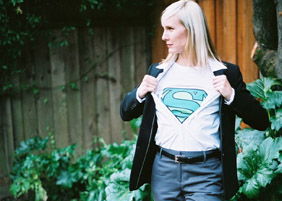Students to Experts Creating Sustainable Success from Triple Bottom Line, Up

Sustainability experts based here in the Bay Area are developing a sustainable business achievement rating system that will set the bar for corporate sustainability. Photo by: Michelle Moday
By Bill Picture
Published: February, 2007
Sustainability is the buzzword du jour among business world higher-ups, particularly corporate types, for whom the Holy Grail, as indicated by many large companiesí recently revised mission statements, is achieving zero-impact status, that is, doing business without negatively impacting the world around them.
But what does that entail? What does sustainability really mean? And how do businesses, big and small, achieve it?
Ask most Bay Areans what sustainability means in respect to business, and theyíre likely to define it as minimizing a businessí environmental impact. But sustainability experts insist that truly responsible business-doing means much, much more than just greening the workplace.
Most people donít really understand the ĎSí word, jokes Joel Makower, founder of GreenBiz.com. So it tends to be used as a proxy for environmentalism. But, for businesses, itís really about measuring their organizationís success in terms of a triple bottom line ó economic, environmental and social.
[ĎSustainabilityí] is a big, big word, adds Oren Jaffe, of San Francisco, a Business Development Manager for Bureau Veritasí Consumer Products Services division. But, when you get right down to it, itís about global citizenship.
Bureau Veritas conducts independent third-party audits of human rights conditions in factories for clients who rely on outsourcing, often to factories in Third World countries, to keep production costs down.
Thatís the social part of sustainability and corporate responsibility, Jaffe explains. And thatís really my passion.
Jaffe helps his clients understand whatís going on in factories from a human rights perspective, in order to help them avoid embarrassing and costly missteps, such as the Nike sweatshop debacle.
Nowadays, companies are much more worried about violating child labor laws, for instance, than they are about a product recall, he says. Minimizing the risk to their brand is really important.
Jaffe says that more and more companies are finally beginning to realize that the same socially responsible business practices that endear them to conscious consumers also boost their organizationís economic bottom lines.
Logic dictates that, if you treat your employees well, they will be happier. So the quality of your product goes up, and consumers buy more of whatever it is youíre selling, he explains.
Clif Bar, Inc., maker of the popular Clif Bar energy bars, is a perfect example of a company investing in its human capital, its employees. A few years ago, the Berkeley-based company began paying its employees to work out for a half-hour each day.
At first glance, this may seem like an unnecessary expense. But, since the program was implemented, Clif Barís healthcare costs have gone down, and employees have taken fewer sick days.
Clif Bar also encourages its employees to do volunteer work while on the company clock. Together, these programs have resulted in increased productivity and an upswing in revenue.
While data proving big businessí role in the global warming crisis is irrefutable, Jaffe says that an absence of more, quantitative hard evidence that can be used to drive home the benefits of social responsibility with skeptical CEOs and CFOs is keeping the concept of across-the-board sustainability from being embraced by mainstream corporate culture.
So, too, is the lack of a non-industry-specific standard against which an organizationís performance in respect to sustainability can be measured. To that end, a team of sustainability experts based here in the Bay Area are developing a rating system. When it is implemented, which is expected to happen within the next five years, S-BAR (Sustainable Business Achievement Rating) will set the bar for corporate sustainability.
For any market to flourish requires norms and standards. And there are none for sustainability, explains Joel Makower, part of the S-BAR advisory council. There is no definition of good, let alone how good is good enough. S-BAR will provide that missing metrics.
Further prompting the business world to make good on its responsibility to the global community, of which it is a part, is the gradual working of social and environmental values into the curriculum of business school students. Four universities currently offer MBA programs related to sustainability management. With degrees in hand, graduates of these programs will go out into the workplace to clue in the rest of the business world on the benefits of thinking globally and in the long term.
When businesses make decisions, they have to look a few steps ahead and consider the consequences and the impact on all aspects of society, explains Dr. Ron Nahser, co-CEO of the Presidio School of Management, whose four-year-old Sustainable Management program now boasts more than 160 students.
We need to learn how to reconcile profit motive with social concern. Our studentsí goal isnít to get a better job or to make a lot of money. Their focus really seems to be one of service.
I want to earn a good living and participate in positive change, says Presidio student Janet Smartt, a web and print designer, who intends to pursue a career in the communications field to help socially responsible organizations, be they non-profit, for-profit or governmental, to spread the word about sustainable practices and environmental stewardship.
Iíve always cared about the environment, says the Tennessee native. I thank my parents for that, and the Girl Scouts. I feel really grateful to be [in this program]. Iíve gained a lot of knowledge, and, when Iím done, I want to share what Iíve learned.
Smartt hopes that, within the next 20 years, sustainable practices will be incorporated into every businessí operating procedures, regardless of the industry or size of the business.
But what weíre going to need is leadership on a national level, she adds. The voice that business will listen to is the voice of policy.
Twenty years is doable, says Joel Makower. A lot has happened in just the last eighteen months. Weíve seen things happen that I never would have predicted happening so quickly. So Iím hopeful.
Bureau Veritas
Joel Makower
www.makower.com.
Sustainable Business Achievement Rating
www.sustainabilityratings.com.
Presidio School of Management


